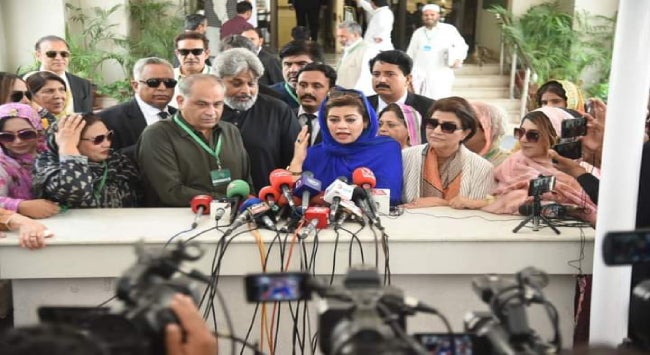The Supreme Court Judgement on PTI’s Reserved Seats Case
Imran Ahmed, Muhammad Saad Ul Haque
2 August 2024Summary
Since the February 2024 general elections, the Pakistan Tehreek-e-Insaaf (PTI) has been striving to uphold and protect its political legitimacy and representation. Among the many issues it faced, the matter of reserved seats was particularly crucial, with the potential to significantly shift the PTI’s political influence. The Supreme Court of Pakistan recently ruled in favour of the PTI, resolving months of unresolved contentions.
Reserved seats, though often overlooked, play a crucial role in elections by ensuring representation for underrepresented groups. In elections, these seats are allocated proportionally based on the number of general seats a party win. According to Pakistani law, out of 266 National Assembly seats chosen in the general elections, 70 are reserved – 60 for women and 10 for minorities. The Pakistan Tehreek-e-Insaaf (PTI) and its electoral partner, the Sunni Ittehad Council (SIC), petitioned the Peshawar High Court to overturn the Election Commission’s decision denying the SIC-PTI their expected quota of reserved seats. However, on 14 March 2024, the High Court rejected the petition.
The PTI and SIC then petitioned the Supreme Court of Pakistan, the apex court of the country’s legal system. On 6 May 2024, the Supreme Court suspended both the Punjab Healthcare Commission and the Election Commission of Pakistan’s (ECP) verdict on the reserved seats issue. The Court further sought to refer the case to a larger bench since the matter required the interpretation of constitutional provisions. As a result, the ECP was forced to suspend the victory notifications of 77 lawmakers, reducing the coalition government’s strength to less than a two-thirds majority.
On 12 July 2024, a 13-member Supreme Court Bench, headed by Chief Justice of Pakistan Qazi Faiz Esa, announced that the PTI was eligible for seats reserved for women and minorities. The landmark ruling saw eight judges in favour while five opposed it. In announcing the verdict, Justice Esa clarified, “As a political party, the PTI is entitled to its reserved seats”. The Supreme Court ordered the PTI to submit its list of names for the reserved seats within the next few weeks and required PTI-backed independents to submit affidavits declaring their political affiliations within the same period. The PTI-SIC coalition currently holds the most seats for a single party and is expected to add another 20 seats following the verdict.
Many PTI supporters and party members lauded the Supreme Court’s decision. Party leader Gohar Ali Khan spoke to the media after the ruling, stating, “This decision will be remembered in history. It’s a win for Pakistan’s democracy and restores our party’s rights”. He added, “This is a day of joy” while urging PTI supporters to protest their momentous victory peacefully. Another senior leader of the PTI, counsel Hamid Khan, proclaimed the verdict a “historic” first step towards amending a series of transgressions and injustices done to the PTI.
Political and legal experts also heralded the Supreme Court’s decision as having important political and legal ramifications. Constitutional lawyer Rida Hosain stated, “The Court order criticises the ECP for its conduct, which has been detrimental to Pakistan’s democratic process. The electoral watchdog has a constitutional duty to be independent and impartial, yet it acted against a major political party, unlawfully denying [the] PTI its right to contest elections.” Akram Khurram, a specialist in electoral law, called for greater scrutiny of the ECP, saying, “Every judge on the bench concluded that the ECP misinterpreted the Supreme Court’s verdict on [the] PTI’s electoral symbol. The election body must take responsibility for the political crisis and legal complications arising from its decision.”
Furthermore, political analyst Benazir Shah highlighted the important political implications of the decision, declaring, “If [the] PTI had lost the reserved seats, it would have further damaged [the] parliament’s credibility. Now, with reserved seats allocated to [the] PTI, it has become the largest political party in parliament”. She added that now the PTI is in a better position to potentially negotiate with other parties, such as the Pakistan People’s Party (PPP), who had initially declared some interest in forming a government.
Although the verdict was a major victory for the PTI and the SIC, the ruling coalition plans to ban the PTI and seek treason charges against Imran Khan, citing factors like the May 2023 riots and alleged acquisition of illegal funds. Interestingly, coalition partners like the PPP have reacted ambiguously towards these statements, revealing underlying tensions within the already fragile coalition.
. . . . .
Dr Imran Ahmed is a Research Fellow at the Institute of South Asian Studies (ISAS), an autonomous research institute in the National University of Singapore (NUS). He can be contacted at iahmed@nus.edu.sg. Mr Muhammad Saad Ul Haque is a research analyst at the same institute. He can be contacted at msaaduh@nus.edu.sg. The authors bear full responsibility for the facts cited and opinions expressed in this paper.
Pic credit: reserve seats pakistan – Search / X (twitter.com)
-
 More From :
More From :
-
 Tags :
Tags :
-
 Download PDF
Download PDF



